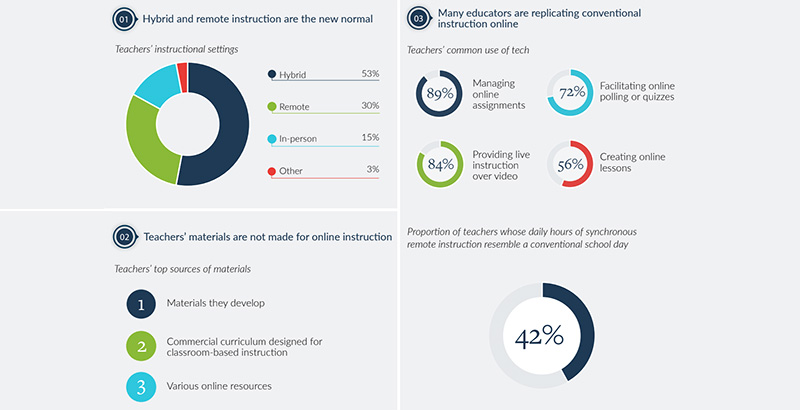The 12 Best Education Articles from February: How Extremists Are Teaching Kids to Hate, the White House Staffs Up With Education Experts, Recruiting an Army of Online Tutors & More
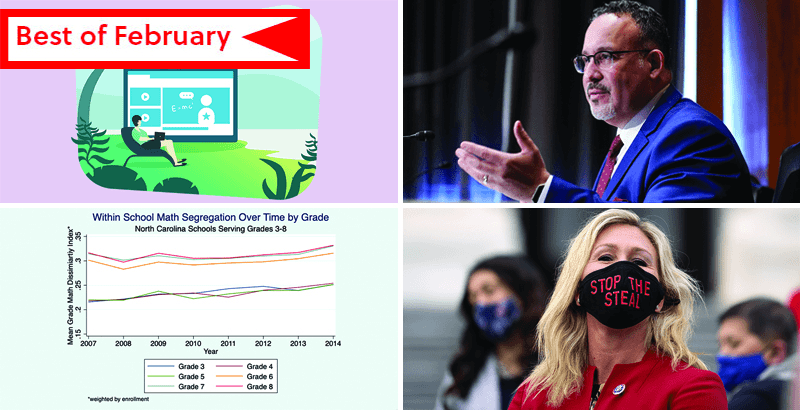
Every month, we round up our most popular and shared articles from the past four weeks. (Go deeper: See our top highlights from December, November and beyond right here)
Vaccines, CDC guidance for safe classrooms and a growing consensus that districts will need additional federal funds to facilitate reopening — the conversation surrounding the nation’s schools turned towards the future this month, and President Biden’s commitment to get many reopened within his first 100 days. At The 74, our February coverage focused extensively on the learning losses associated with school closures and new strategies to accelerate learning, as well as new research on such issues as teacher quality, socioeconomic segregation and evolving attitudes on the value of virtual learning even after the pandemic is over. Below are our most popular articles of the month. (Reminder: You can also get alerts about our latest news coverage, essays and exclusives by signing up for The 74 Newsletter)
How White Extremists Teach Kids to Hate: Alt-Right Groups Use Online Gaming Communities Popular Among Teens to Recruit Culture Warriors
Student Safety: Five days after extremists used the fringe video gaming platform Dlive to livestream a mob attack on the U.S. Capitol Jan. 6, a youthful white nationalist logged on to the site and offered his take about the future of a movement he helped create — a radical agenda, experts warn, that’s targeted at teens. As the Capitol riot reawakens many Americans to the persistent reality of white supremacists among us, experts on extremism are sounding the alarm about the ways alt-right groups weaponize video games and streaming platforms to recruit and radicalize impressionable young minds. For teenagers whose isolation has been heightened by the pandemic, the desire for connection makes them particularly vulnerable, particularly in the current political climate. But experts say parents and educators can intervene before it’s too late. Read more by The 74’s Mark Keierleber.
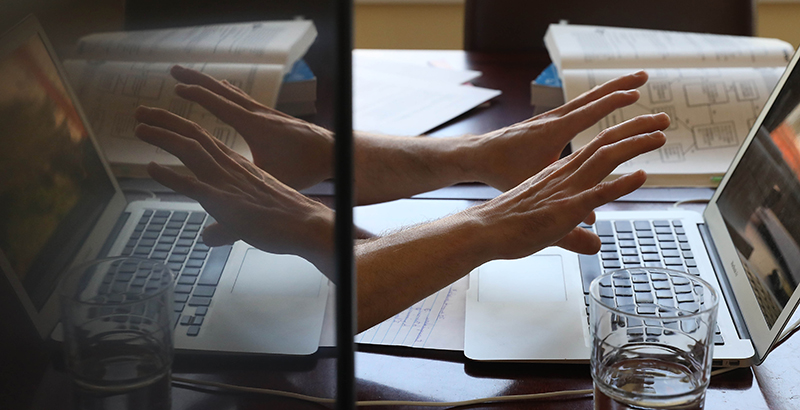
Now Recruiting: Online Army of Volunteer Tutors To Fight ‘COVID Slide’
Accelerating Learning: The news about pandemic-related learning loss keeps getting worse. A recent McKinsey & Co. study predicted that cumulative loss due to COVID-19 could be “substantial, especially in mathematics,” with students likely to lose five to nine months of learning by the end of this school year. Key educators are advocating an unusual remedy: a national, online volunteer tutoring force. 74 contributor Greg Toppo describes it as “a sort of digital Peace Corps meets Homework Helpers.” The idea has been endorsed by three former U.S. education secretaries. But as Congress and the Biden administration work out their early priorities, the nonprofit sector has begun to step in. Sal Khan, founder of Khan Academy, has created what he and others think is a scalable blueprint for a national tutoring effort, one that could match knowledgeable adult volunteers — as well as millions of young people who have mastered key concepts — with students in need. Already, two states — Rhode Island and New Hampshire — have signed on to Schoolhouse.World, with more expected soon. “This is like a lifeline,” said Rhode Island Education Commissioner Angelica Infante-Green.
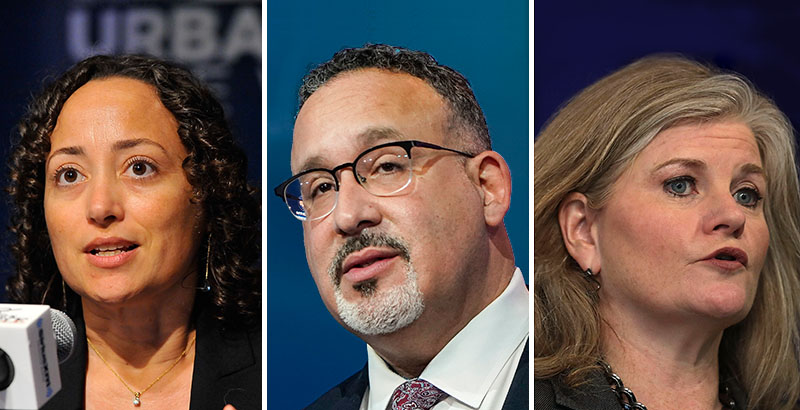
With Former Top-Ranking Education Staff as Key Biden Advisers, Will White House and Ed Department Be on the ‘Same Page?’
Education Department: President Joe Biden has assembled a domestic policy team that includes officials who held high-level positions at the Department of Education during the Obama years. Education secretary nominee Miguel Cardona would bring the voice of classroom experience to the department. With so many urgent demands on the administration related to reopening schools, some wonder whether the White House and department officials will send a unified message to schools and families about getting students back in classrooms, or whether tensions will arise. There’s a precedent for the White House taking the lead on ed policy, and former Education Secretary Margaret Spellings suggests that for now, “the power center will be the White House.” Speaking on the radio last week, Cardona said it will be important “to make sure there is consistency in messaging, to make sure there is one message, one plan.” At least one expert is calling for a blue-ribbon commission on the federal government’s role in reopening — a monumental task “even if everyone is on the same page.” Linda Jacobson reports.
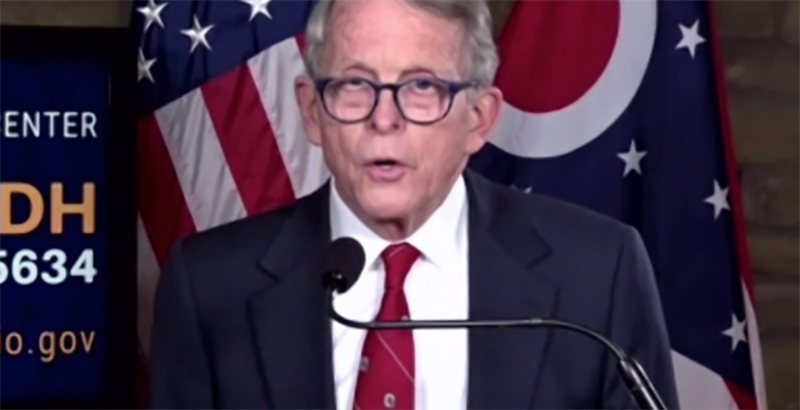
‘Simply Unacceptable’: Ohio Gov. DeWine Threatens to Withhold Early Vaccines From School Staffers if Cleveland Schools Fail to Reopen Classrooms By March 1
Reopening: Calling plans by the Cleveland school district to ignore its commitment to reopen schools by March 1 “simply unacceptable,” Ohio Gov. Mike DeWine threatened to pull early vaccines from school staff. District CEO Eric Gordon, who had moved back the reopening target to April 6, changed course in a phone call with DeWine, the governor said at a Feb. 12 press conference. “Your commitment is not just to me,” DeWine said. “Your commitment is to the children in your district and your commitment is to your parents, your parents who said, ‘Yes, I want my child back.’” A press release from the district did not commit to reopening by March 1 but said Gordon will announce plans Feb. 19, as scheduled. Reopening delays by the Akron school district and one high school in Cincinnati also drew DeWine’s attention. Patrick O’Donnell reports.
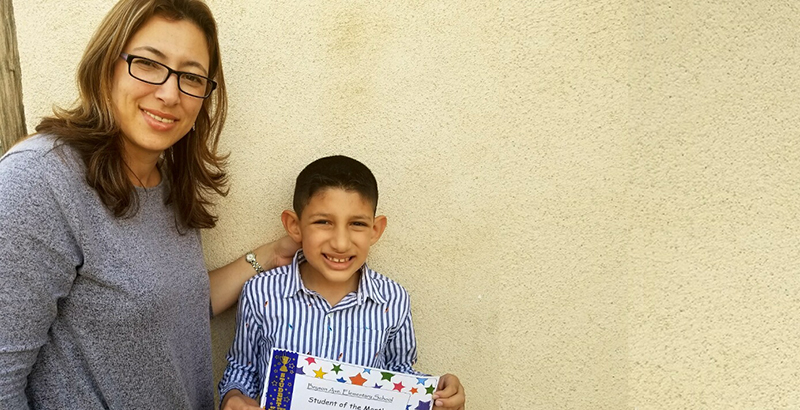
Federal Probes into Lack of School Services for Special Needs Students Reflect Nearly a Year of Parental Anguish, Advocates Say
Special Education: In the waning days of the Trump administration, the U.S. Department of Education’s civil rights office launched four investigations into whether schools failed to serve students with disabilities during the pandemic. As 74 contributor Jo Napolitano reports, the inquiries came as no surprise to many parents who have watched their children lose skills it took them years to build. The probes — covering the state school system in Indiana, as well as districts in Los Angeles, Seattle and Fairfax, Virginia — reflect “similar complaints from all across the country,” said Denise Stile Marshall, head of The Council of Parent Attorneys and Advocates, a group that works on behalf of children with disabilities. “Many parents are desperate and at their wits’ end.”
Report: New Summer Learning Initiative, Launched Last Year as a 5-Week Pilot for Nearly 12,000 Students, Shows Promise For Improving Online Instruction
Summer School: America’s rapid transition to virtual learning left huge numbers of teachers discouraged and parents worried about disastrous academic setbacks for their children. Some policymakers have wondered whether schools should stay open this summer to make up for lost time, including President Joe Biden, who suggested as much earlier this week. Now, a study finds that a summer program providing remote instruction in the midst of the pandemic has earned high marks from participants. The National Summer School Initiative, established last spring by a coalition of education reformers, offered five weeks of virtual math, literacy and enrichment classes to nearly 12,000 students. Some 500 educators were paired with 15 mentors who sent videos of their own teaching, advised on methods and debriefed after classes. And according to surveys and interviews, most participants were satisfied with the results: By the final week of the program, 65 percent of students said they were happy to be participating in summer school, and 86 percent of teachers said it improved their perception of online instruction. “What we’re finding here is that the folks who participated felt like this was a really engaging and positive kind of virtual experience,” study co-author Beth Schueler told Kevin Mahnken.

Rep. Marjorie Taylor Greene Endorsed Conspiracy Theories About the Parkland Shooting. A Civics Teacher at Marjory Stoneman Douglas Turned It Into a Lesson
Civics Education: As newly elected GOP Rep. Marjorie Taylor Greene’s embrace of conspiracy theories about the mass school shooting in Parkland, Florida, generated national headlines and calls for her expulsion from Congress, a teacher who lived through the violence did what he does best: turn the moment into a learning opportunity. Jeff Foster, who teaches Advanced Placement Government at Marjory Stoneman Douglas High School, where 17 people died in the 2018 shooting, frequently uses current events as lessons about the importance of civic participation. Even the Jan. 6 mob attack on the U.S. Capitol sparked lively debate among his politically engaged students. But this conversation was different: Everybody in the class agreed that the comments from Greene, a freshman congresswoman from Georgia, were reprehensible. But even more shocking, Foster and other Parkland survivors said, was the failure of Republican leadership to respond with swift action. Read more by The 74’s Mark Keierleber.
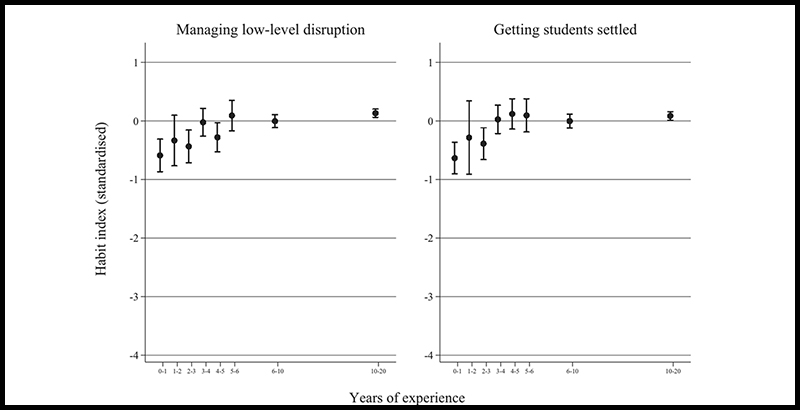
Force of Habit: New Study Finds that Routines Could Be Blocking Teacher Improvement
Teacher Quality: For teachers, the development of habits is a necessary concession to the unpredictable nature of their job. Morning assignments, class transitions, even behavior management need to be governed by routines that are as predictable for kids as they are effective for adults. But according to new research, these habits may be responsible for the slowing rate of improvement after teachers’ first few years on the job. As classroom practices become more automatic, they are also harder to change when they stop achieving their desired results. The profession is consistently subject to so many ambitious reforms — from the Common Core to the science of reading to implicit bias training — that practitioners need to be open to new methods, the authors argue. Kevin Mahnken explains.
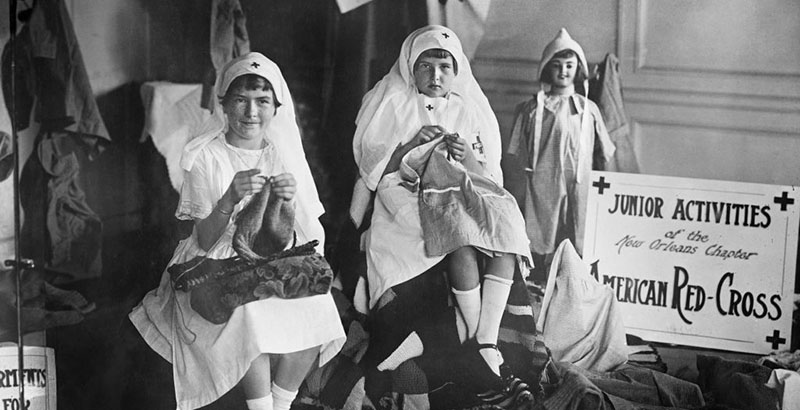
Aldeman: Lessons from Spanish Flu — Babies Born in 1919 Had Worse Educational, Life Outcomes Than Those Born Just Before or After. Could That Happen With COVID-19?
History: Contributor Chad Aldeman has some bad news: The effects of COVID-19 are likely to linger for decades. And if the Spanish Flu is any indication, babies born during the pandemic may suffer some devastating consequences. Compared with children born just before or after, babies born during the flu pandemic in 1919 were less likely to finish high school, earned less money and were more likely to depend on welfare assistance and serve time in jail. The harmful effects were twice as large for nonwhite children. It may take a few years to see whether similar educational and economic effects from COVID-19 start to materialize, but these are ominous findings suggesting that hidden economic factors may influence a child’s life in ways that aren’t obvious in the moment. Hopefully, they will give policymakers more reasons to speed economic recovery efforts and make sure they deliver benefits to families and children who are going to need them the most.
Arnett: Will Shift to Online Classes Speed Progress Toward Student-Centered Learning? Survey Hints at Some Ways Forward
Future of Education: Will the forced adoption of online learning accelerate innovation in K-12 education and its transformation toward more student-centered learning? Results from a nationally representative survey research project co-led by contributor Thomas Arnett offer some answers. The survey of 596 U.S. K-12 teachers and 694 school and district administrators found many teaching remotely or in a hybrid arrangement — and issues with both synchronous (live class meetings over video calls) and asynchronous (via independent study materials and delayed communication such as email) approaches. One solution: A mix of asynchronous and synchronous online learning, when executed effectively, can have important benefits for students. Teachers’ adoption of online learning resources does not guarantee that online instruction becomes student-centered. Nonetheless, their growing familiarity with these resources makes the shift to student-centered practices much easier. When schools can go back to normal, many families and educators may be eager to say good riddance to online learning. But it’s encouraging to see educators discovering ways to use it to make their instruction more student-centered.
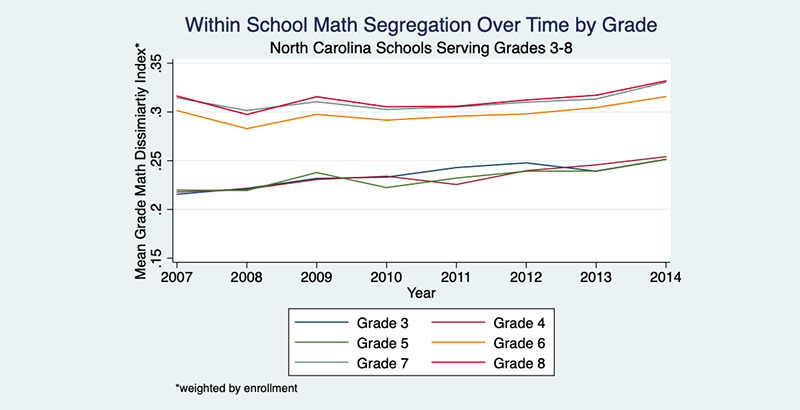
Segregation by Income Increasing in Classrooms, New Study Finds, May Reflect Influence of Wealthy Parents
Socioeconomic Segregation: It’s a foundational premise of the American dream that through hard work and diligent study, young people can use education to access opportunities denied to their parents. However, mounting evidence suggests that segregation — not just by race, but also by income — within school systems may stymie those meritocratic aspirations. Previous research has documented the steady uptick in wealth gaps between schools, but a new working paper published by the Annenberg Institute at Brown University finds that income segregation within schools, from classroom to classroom, is also on the rise. However, it’s not all bad news. The researchers also show that in North Carolina, districts with more economically integrated schools also tended to have schools with more economically integrated classrooms. “It’s not inevitable that when we take affirmative measures to integrate by income, that schools will invariably resegregate at the classroom level,” said Richard Kahlenberg of The Century Foundation. Asher Lehrer-Small has the story.
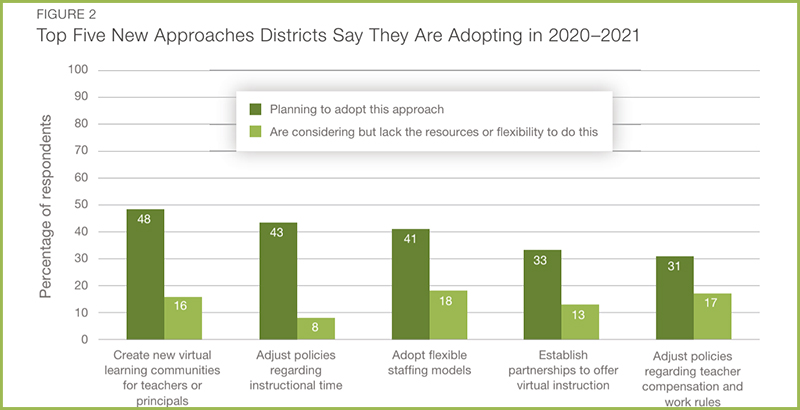
Analysis: Survey of District Leaders Shows Online Learning Is Here to Stay. Some Ways of Making It Work for Students Beyond the Pandemic
Remote Learning: A new, nationally representative survey of district leaders shows that remote coursework is here to stay — and school systems will have to apply the lessons from their forced experiments with virtual learning during the pandemic to better adapt. The first survey conducted through the new American School District Panel shows 1 in 5 districts are considering, planning to adopt or have already adopted a fully online school in future years, and 1 in 10 has adopted blended or hybrid instruction, or plans to. Of all the pandemic-driven changes in public education, the creation of virtual schools was the one that the greatest number of district leaders anticipated would continue into the future. Remote instruction is a fundamentally different task than what school districts are designed for, as school systems nationwide learned when they were forced to suddenly close last spring. But, write contributors Heather Schwartz and Paul Hill, lessons from six case studies demonstrate how districts can use their pandemic-related momentum to make online learning a common staple of public schooling.
Get stories like these delivered straight to your inbox. Sign up for The 74 Newsletter

;)


